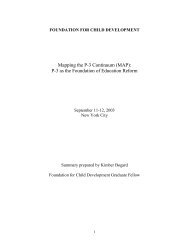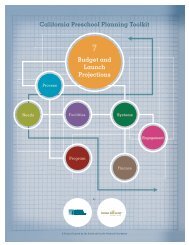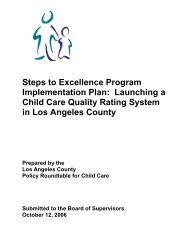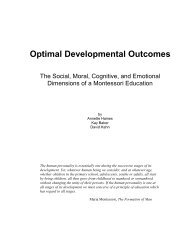Download this file - Plan4Preschool
Download this file - Plan4Preschool
Download this file - Plan4Preschool
You also want an ePaper? Increase the reach of your titles
YUMPU automatically turns print PDFs into web optimized ePapers that Google loves.
County Offices of Education <br />
There are 58 county offices of education that provide services to the state’s school<br />
districts. The county offices have elected governing boards and are administered by<br />
elected or appointed county superintendents.<br />
The county superintendent is responsible for examining and approving school district<br />
budgets and expenditures. With the passage of Assembly Bill 1200 (1991), the county<br />
superintendent has additional powers to enforce sound budgeting to ensure the fiscal<br />
integrity of the district. The superintendent is also responsible for calling school district<br />
elections and assisting with school district emergencies by providing necessary<br />
services.<br />
County offices of education support school districts by performing the tasks that can be<br />
done more efficiently and economically at the county level. The county offices provide<br />
or help formulate new curricula, staff development and training programs, and new<br />
instructional procedures; design business and personnel systems; and perform many<br />
other services to meet changing needs and requirements. When economic or technical<br />
conditions make county or regional services most appropriate for students, county<br />
offices provide a wide range of services, such as special and vocational education,<br />
programs for youths at risk of failure, and instruction to youths in juvenile detention<br />
facilities.<br />
Local Control<br />
Although the California public schools system is a statewide system under the policy<br />
direction of the Legislature, more local responsibility is legally granted to school districts<br />
and county education officials than to other government entities and officials.<br />
Statutes relating to school districts, county boards of education, and county<br />
superintendents of schools operate differently from any other California statutes.<br />
Because the plenary power to make state policy and law rests with the Legislature, the<br />
general rule of law is that an agency of government is permitted to do only that which is<br />
authorized by statute; it cannot do or undertake any program or activity simply because<br />
it is not prohibited. In 1972, however, the voters amended the California Constitution. As<br />
a result, the general rule has been altered only for school districts. Thus, laws relating to<br />
local schools occupy a unique constitutional position.<br />
Under <strong>this</strong> “permissive education code,” as long as a statute does not prohibit the<br />
program or activity and it is consistent with the purposes for which school districts are<br />
established, it can be undertaken. In other words, it is constitutionally unnecessary to<br />
enact any statutes that merely allow or permit school districts, at their discretion, to do<br />
something.<br />
18
















